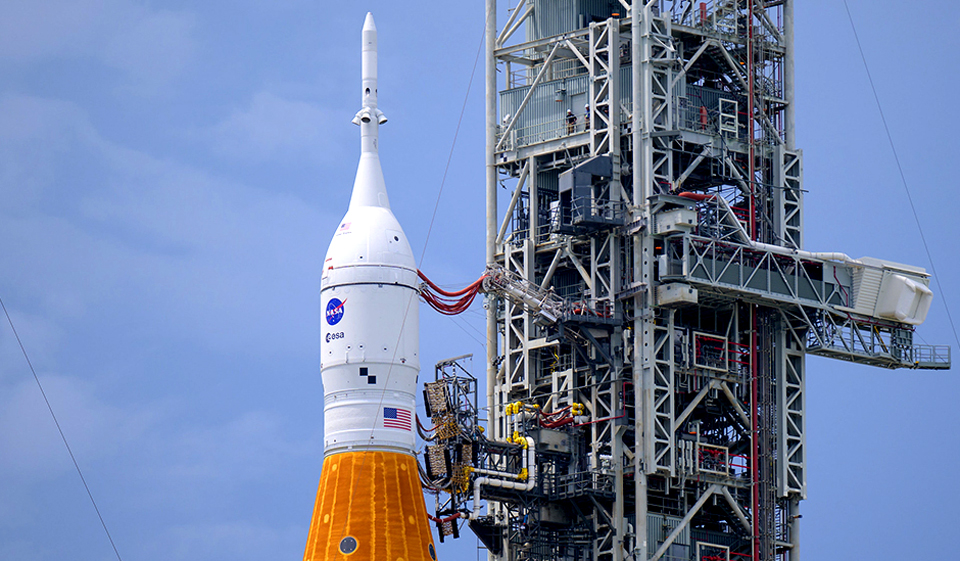
KENNEDY SPACE CENTER, United States, Aug 30, 2022 (BSS/AFP) - NASA has
scrubbed a test flight of its powerful new rocket, in a setback to its plan
to send humans back to the Moon and eventually to Mars, but may shoot for
another launch attempt on Friday.
"We don't launch until it's right," NASA administrator Bill Nelson said after
an engine issue forced a cancellation of Monday's flight from the Kennedy
Space Center in Florida.
"This is a very complicated machine," Nelson said. "You don't want to light
the candle until it's ready to go."
The goal of the mission, baptized Artemis 1 after the twin sister of Apollo,
is to test the 322-foot (98-meter) Space Launch System (SLS) rocket and Orion
crew capsule that sits on top.
The mission is uncrewed -- mannequins equipped with sensors are standing in
for astronauts and will record acceleration, vibration and radiation levels.
Mike Sarafin, mission manager of Artemis 1, said the space agency is hoping
to make another launch attempt later this week.
"Friday is definitely in play," Sarafin said.
NASA would have a better idea of whether a Friday launch is feasible after a
meeting on Tuesday of the management team, he said.
"We just need a little bit of time to look at the data," Sarafin said.
Next Monday, September 5, is an alternative launch date.
Blastoff had been planned for 8:33 am (1233 GMT) but was cancelled because a
test to get one of the rocket's four RS-25 engines to the proper temperature
range for launch was not successful.
Delays are "part of the space business," Nelson said, expressing confidence
NASA engineers will "get it fixed and then we'll fly."
Tens of thousands of people -- including US Vice President Kamala Harris --
had gathered to watch the launch, which comes 50 years after Apollo 17
astronauts last set foot on the Moon.
"Our commitment to the Artemis Program remains firm, and we will return to
the Moon," Harris tweeted.
Veteran NASA astronaut Stan Love told reporters he was disappointed but "not
really surprised."
"This is a brand new vehicle," Love said. "It has a million parts. All of
them have to work perfectly."
- Extreme temperatures -
Overnight operations to fill the orange-and-white rocket with ultra-cold
liquid hydrogen and oxygen were briefly delayed by a risk of lightning.
A potential leak was detected during the filling of the main stage with
hydrogen, causing a pause. After tests, the flow resumed.
NASA engineers later detected the engine temperature problem and decided to
scrub the launch.
The Orion capsule is to orbit the Moon to see if the vessel is safe for
people in the near future. At some point, Artemis aims to put a woman and a
person of color on the Moon for the first time.
During the 42-day trip, Orion will follow an elliptical course around the
Moon, coming within 60 miles (100 kilometers) at its closest approach and
40,000 miles at its farthest -- the deepest into space by a craft designed to
carry humans.
One of the main objectives is to test the capsule's heat shield, which at 16
feet in diameter is the largest ever built.
On its return to Earth's atmosphere, the heat shield will have to withstand
speeds of 25,000 miles per hour and a temperature of 5,000 degrees Fahrenheit
(2,760 degrees Celsius) -- roughly half as hot as the Sun.
- Crewed mission to Mars -
NASA is expected to spend $93 billion between 2012 and 2025 on the Artemis
program, which is already years behind schedule, at a cost of $4.1 billion
per launch.
The next mission, Artemis 2, will take astronauts into orbit around the Moon
without landing on its surface.
The crew of Artemis 3 is to land on the Moon in 2025 at the earliest.
And since humans have already visited the Moon, Artemis has its sights set on
another lofty goal: a crewed mission to Mars.
The Artemis program aims to establish a lasting human presence on the Moon
with an orbiting space station known as Gateway and a base on the surface.
Gateway would serve as a staging and refueling station for a voyage to the
Red Planet that would take a minimum of several months.